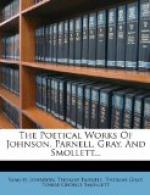Yet Swift continued his friend, and it was at his instance that, in 1713, Archbishop King presented Parnell with a prebend. In 1714, his hope of London promotion died with Queen Anne; but in 1716, the same generous Archbishop bestowed on him the vicarage of Finglass, in the diocese of Dublin, worth L400 a-year. This preferment, however, the poet did not live long to enjoy,—dying at Chester, in July 1717, on his way to Ireland, aged thirty-eight years. His estates passed to his nephew, Sir John Parnell. He had, in the course of his life, composed a great deal of poetry; much of it, indeed, invita Minerva. After his death, Pope collected the best pieces, and published them, with a dedication to Lord Oxford. Goldsmith, in his edition, added two or three; and other editors, a good many poems, of which we have only inserted one, deeming the rest unworthy of his memory. In 1788 a volume was published, entitled, “The Posthumous Works of Dr T. Parnell, containing poems moral and divine.” These, however, attracted little attention, being mostly rubbish. Johnson says of them, “I know not whence they came, nor have ever inquired whither they are going.” It is said that the present representative of the Parnell family preserves a mass of unpublished poems from the pen of his relative. We trust that he will long and religiously refrain from disturbing their MS. slumbers.
The whole tenor of Parnell’s history convinces us that he was an easy-tempered, kind-hearted, yet querulous and self-indulgent man, who had no higher motive or object than to gratify himself. His very ambition aspired not to very lofty altitudes. His utmost wish was to attain a metropolitan pulpit, where he could have added the reputation of a popular preacher to that of being the protege of Swift, and the pet of the Scriblerus Club. The character of his poetry is in keeping with the temperament of




